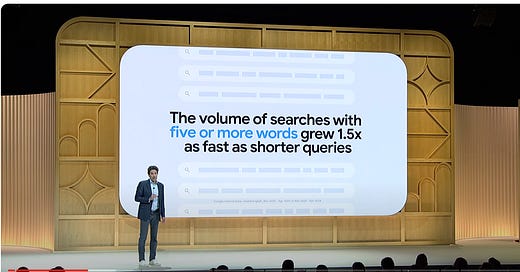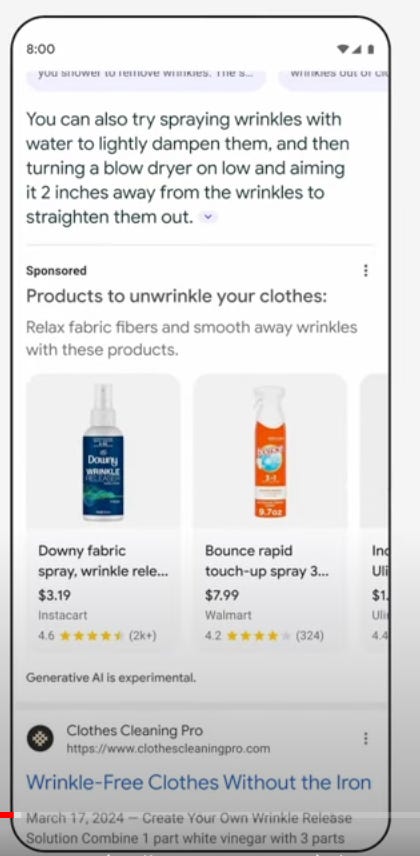Prepare for the coming SEO Apocalypse
The launch of Google's AI Overviews is just the beginning and the real impact to SEO is still to come.
This week’s newsletter is sponsored by the Digital PR agency Search Intelligence, which uses PR methods to grow a link portfolio and North Star Inbound, which is a recommended agency for penalty recovery. See their case studies linked in the newsletter.
This week’s recommended resources:
{Sponsored} Join GrowthWaves Pro with a 50% discount for the 1st year (discount code: 'FIRST100') and get smarter about growth.
Register for this Wix webinar, where I will share how to adapt to AI overviews
Amazon discounted the Kindle version of my book to $.99
I first shared that we were on the cusp of an SEO apocalypse a year ago when the world first saw what was then called SGE.
At the time, many in the SEO community insisted that this would never launch due to its feasibility issues and challenges to Google’s advertising-funded business model. Google faces enormous challenges, from cost to logistics, but generative AI presents an existential risk to its business and doesn’t have a choice.
[SPONSORED by Search Intelligence]
How to earn top-tier links in 3 simple steps:
▪ Watch the weather
▪ Give advice on how to cope with the weather change
▪ Pitch the advice to top-tier journalists
Link building is simple 🤷♂️
I warned my clients to be prepared as early as possible. While I had no secret info about Google’s product plans, I would rather be the one who warned of the apocalypse that was averted than be guilty of keeping my mouth shut and leaving them surprised.
What I advised my clients then is still the same thing I would recommend today: create SEO strategies that do not rely only on top-of-funnel high-volume search queries. Build content and strategies for individual users and incorporate them into the product and content roadmaps, essentially Product-Led SEO.
AI Overviews launched
As predicted, Google launched its AI product, AI Overviews, at Google I/O last week. Despite the mounting concern about what this can do to SEO, I believe it could worsen.
From the sites I monitor, I have not yet seen disruption to SEO at a grand scale, but I also think we are just at the early stages of what this product will become.
I firmly believe that the old way of doing SEO is on the cusp of an apocalypse, and it’s an adapt-or-die moment for most people who rely on organic search.
Here’s why.
Sundar’s own words: Early this week, Sundar Pichai, the CEO of Alphabet, was a guest on the Verge’s Decoder podcast. I would urge everyone to listen, but here are two crucial points.
He restated the point from I/O that users click on links in the Overviews box but said that it’s because they have additional context. In Google’s view, this is suitable for users, and they will continue adding context to results. (That’s bad for traditional SEO!)
He would not commit to adding overview data to Google Search Console, which means that this will grow as a blind spot.
Google Marketing Live: This week, Google held its annual conference, where they share updates mostly in advertising with their agency and brand partners. Again, I suggest you watch the keynotes and breakouts on YouTube for those who want to be more informed. The three big things I heard relevant for SEO and AI Overviews were the following:
Google shared that they see many more 5-word queries, a significant move away from the single-word phrases many target today.
Currently, Google Lens generates 12 billion visual searches per month, but few SEOs have considered optimizing for this type of search.
Lastly, in the keynote, Phillip Schindler explicitly said, “Soon when people come to search for ideas, they'll get more than an AI-generated answer. They will get an entire AI-organized page custom built for them and their question.” This means that what we see today WILL still change.
Moving Target: Launching AI Overviews is not the end of a journey but the beginning of one. Bing, OpenAI, Meta, Perplexity, and others launching search products will continue innovating. Google needs to skate to where the puck will be and not to match the competition. Today’s AI Overviews only get Google to parity with Bing; it does not advance beyond that.
Project Astra: At both I/O and Google Marketing Live, Google had fascinating demos of the Project Astra AI agent. It’s very impressive technology, and you can expect it to be merged into search roadmaps, too. It may finally make the Google Assistant installed on billions of Android devices and tens of millions of Google Home devices. This very powerful search tool eliminates the need ever to use a browser.
Ads in AI: Less urgent but relevant, Google announced ads appearing in AI overviews. This will further depress CTR on the organic listings beneath AI Overviews as the entire search experience moves to the AI-generated answer. This will be slowly rolled out, and it’s clear that this product isn’t fully developed yet.
Think of this moment as a profound platform change, like when the web moved from desktop to mobile, but this is happening much faster. Don’t hang on to the past; start embracing this future now. Assuming ten blue link searches are obsolete, you can start embracing the future.
Embrace new formats
SEO will become multimodal—don’t think of SEO as just query searches. Have a reverse image lookup strategy. I don’t yet have one that works, but if you have one, please share.
I think it’s very likely that we will see TikTok leave the US market (layoffs in marketing aren’t a positive sign for their future). This means that much of the short-form video audience will turn to Instagram, but YouTube shorts will have a chance to achieve more market share. Expect Google to seize that moment to gain attention for this product in search results, so be prepared by having your content available on YouTube shorts.
AI content is risky
If your SEO approach starts with “AI prompt,” it’s not a competitive and sustainable strategy. As you will hear in Sundar’s interview linked above, filtering out helpful content is something they are very actively working on.
Using AI to create content is a short-term solution to a long-term problem. Users will eventually revolt against the proliferation of low-quality, emotionless content, so make your audience paramount in your marketing focus, not cost.
Find new ideas
With the intersection of AI questions and search queries, query lengths will inevitably grow. This means keyword research becomes more about finding topics and suggestions than precise one—to two-word phrases. In a future newsletter, I will delve into how to get your users to share their keywords, but in the meantime, Google Suggest is your friend.
Change KPI’s
Rankings as a KPI have never been the best barometer of SEO success, but with the increase in keyword possibilities, tracking rankings will become nearly impossible. Find a far better KPI like revenue or some other leading metric.
Also, given the new realities of search layouts, your tracking tools might need to change and look for new ways to measure search visibility. (Share if you have a favorite.)
The future is bright, not bleak
We don’t know what the future holds for other search engines, so be prepared for anything, even a Meta or Apple search engine.
In all of these formats, search will always exist, which means there will always be SEO. SEO will never die.
To be very clear, I think this transformation is excellent for the future of SEO. Stay flexible, adapt fast, and reach out if I can help!
[Sponsored by North Star Inbound ]
This is the exact playbook we ran for a dental client.
In a few short months, the results was:
$139,801 in revenue.
Old SEO playbook:
Create 1000s of pages and rank for millions of keywords.
Alienate users with mass-produced content.
Buy links, run link exchanges, scale your guest posting to boost your rankings so more people can check out the bad mass-produced pages.
New SEO playbook:
Create 100 pages that are best in class, help users solve their problems, honestly present various solutions, and position you as a great option.
Keep those pages up to date be refreshing content regularly.
Create original research and thought leadership content that builds your brand while attracting journalists who want to write about your content.
People who find your pages organically immediately feel served by the content and develop a positive association with your brand. They convert at a higher level or place you on a shortlist.
Get your New SEO Playbook.






Eli, this is great stuff. Did you get any sense on timing for some of the bigger changes - especially ads within AI overviews?